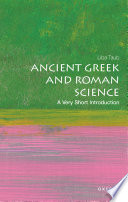

Most ebook files are in PDF format, so you can easily read them using various software such as Foxit Reader or directly on the Google Chrome browser.
Some ebook files are released by publishers in other formats such as .awz, .mobi, .epub, .fb2, etc. You may need to install specific software to read these formats on mobile/PC, such as Calibre.
Please read the tutorial at this link: https://ebookbell.com/faq
We offer FREE conversion to the popular formats you request; however, this may take some time. Therefore, right after payment, please email us, and we will try to provide the service as quickly as possible.
For some exceptional file formats or broken links (if any), please refrain from opening any disputes. Instead, email us first, and we will try to assist within a maximum of 6 hours.
EbookBell Team

0.0
0 reviewsAt the same time, the scientific thinkers of early Greece and Rome were also influenced by ideas from other parts of the world, and incorporated aspects of Egyptian, Babylonian, and Indian science and mathematics in their studies.
In this Very Short Introduction Liba Taub gives an overview of the major developments in early science between the 8th century BC and 6th century AD. Focussing on Greece and Rome, Taub challenges a number of modern misconceptions about science in the classical world, which has often been viewed with a modern lens and by modern scientists, such as the misconception that little empirical work was conducted, or that the Romans did not 'do' science, unlike the Greeks.
Beginning with the scientific notions of Thales, Pythagoras, Parmenides and other Presocratics, she moves on to Plato and Aristotle, before considering Hellenistic science, the influence of the Stoics and Epicurean ideas, and the works of Pliny the Elder, Eratosthenes, and Ptolemy.
In her sweeping discussion, Taub explores the richness and creativity of ideas concerning the natural world and its function in the ancient world, and the influence these ideas have had on later centuries.